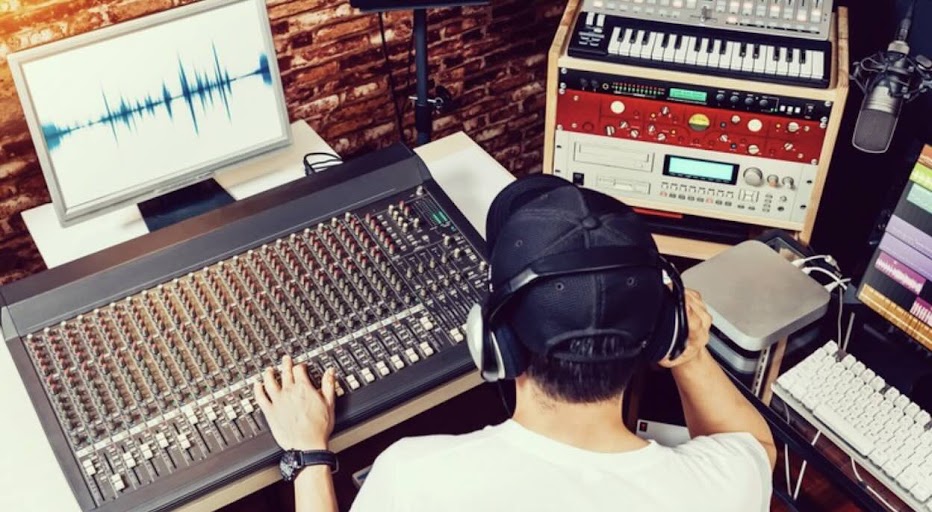What is audio mastering?
Audio mastering is perhaps one of the most mysterious topics in the audio field. This may happen because mastering is done by a specialized engineer. Another point would be that the client is not usually involved in the mastering process and so, the kind of work done while mastering is not too obvious for most people. |
| Fig. 1. Audio console |
But, what is mastering? We could say that mastering is the last stage in the music production process. That is, the last stage where we can make decisions and take actions from a creative point of view (sound processing). After mastering, there are no chances for any additional change, neither audio processing nor editing. In mastering we get the final master.
The master is the final disc which is the basis for all replications. Technically speaking, mastering is the manufacturing process of this master disc. Yet, we usually call mastering to the creative audio process too. In this stage we can improve the overall audio quality, spectral balance, dynamic range, etc. In our digital era, we can call "master" to the final audio file which will be distributed through an Internet platform: iTunes, Spotify, YouTube, Soundcloud, etc.
The mastering studio
The place where mastering should be done has very unique characteristics. Perhaps the most important one is the acoustic treatment. An engineer's decisions depend on what he can hear. Studio acoustics play a fundamental role in this sense.Excellent studio acoustics can be very expensive. This is why it's not easy for everyone to have the optimal place to master a project, at least not at the top profesional level. In this sense, the mastering studio should have a delicate balance between sound absorption, diffusion and reflection. The soundproofing should be excellent as well. Besides of that, there shouldn't be large objects or surfaces that could affect the sound waves in a negative way. An example of this could be a big mixing board or studio windows.
 |
| Fig. 2. Mastering studio Eternal Midnight |
The mastering gear
Another important characteristic in a mastering studio is the audio gear available. Mastering requires the best audio processors and converters (analog to digital and digital to analog) and this represents another very important investment. It's common to find very expensive equipment in a professional mastering studio. For example, monitoring systems above $10,000 USD, premium or vintage audio processors (equalizers, compressors) around $4000 USD each and software mastering suites that cost above $1500 USD.
 |
| Fig. 3. Typical mastering monitors |
Nowadays, it's usual to find mastering projects for surround sound too. These projects could need 5.1 or more complex audio formats. In these cases, the monitoring requirements increase clearly (at least five monitors and a subwoofer). Furthermore, the electric installation and audio cabling must have excellent quality too to preserve the HI-Fi audio chain. All of this gives us an idea of how specialized a mastering studio should be.
The mastering engineer
The main recommendation is that mastering should be done by a professional with trained ears and a "fresh" approach to the project. This means that mastering engineer and mixing engineer should be two different persons. The advantage of this is that a different engineer could be able to listen to details that the mixing engineer could have missed. Many times, after long hours of mixing work, the ears can "deceive" the engineer because of ear fatigue. Then, the mastering engineer can help by balancing the spectral or dynamic levels from a different point of view, or should I say... hearing!Proper mastering requires a lot of knowledge and skills from an experienced engineer. The ears play a crucial role for this. Many good quality productions can be done in home studios and then enhanced by a professional mastering engineer. The final result of this combination can be excellent.
 |
| Fig. 4. Mastering engineer Dan Millice |
Back on Earth
Mastering is a fascinating area in the audio world. Nowadays, we have the opportunity to use accesible tools to get a very good quality master. All we need is a computer and a couple of software processors to begin with. There are also mastering systems based on AI. This is taking audio mastering to the machine learning frontier.
It is possible to learn basic mastering techniques and improve the audio quality of your productions too. If you are one of those who love to learn, experiment and develop their ears above the average, then mastering could be not so mysterious after all!
It is possible to learn basic mastering techniques and improve the audio quality of your productions too. If you are one of those who love to learn, experiment and develop their ears above the average, then mastering could be not so mysterious after all!
 |
| Online audio mastering course |







0 comments:
Publicar un comentario